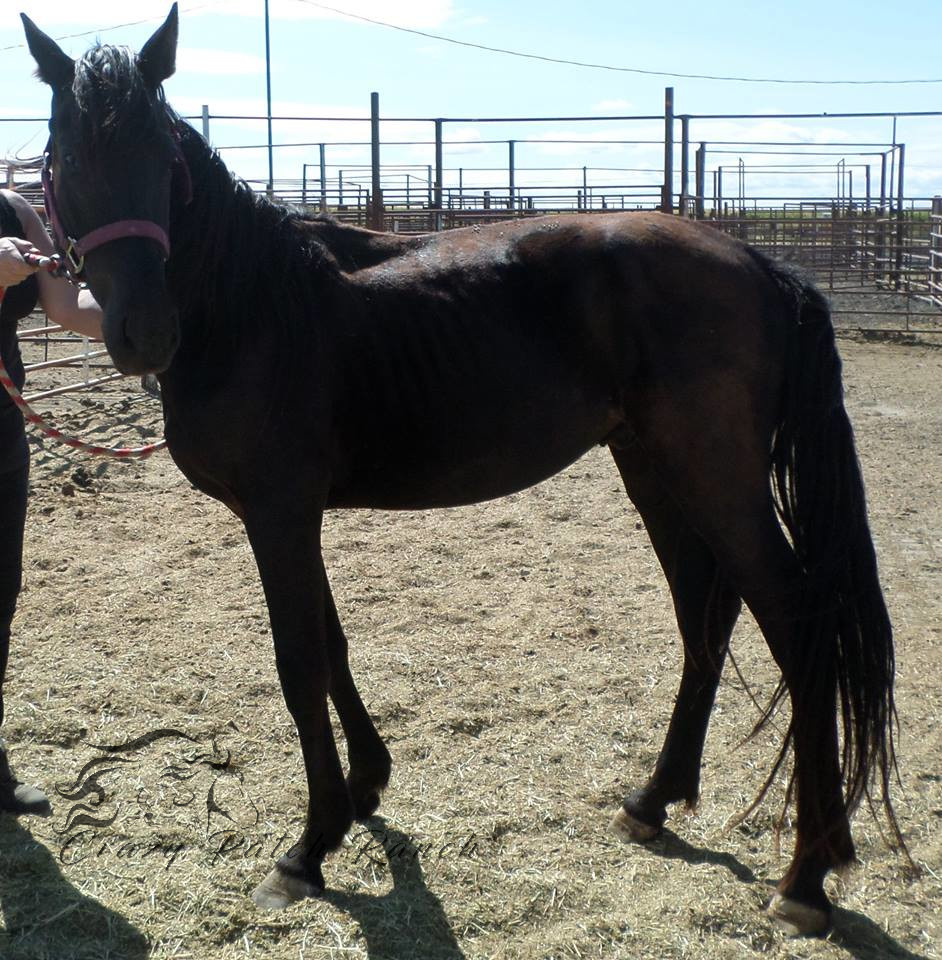Recovering from neglect - Nutrition & exercise care
Bringing a horse back to good health after neglect and starvation is difficult & sometimes it can be hard to know where to start. Of course every case is different but I hope Galaxy's story can be of some assistance to those caring for a horse that came from a neglectful situation.
9/1/15 Galaxy at the feedlot before rescue
On 9/6/15 we rescued this neglected 2 year old colt from the slaughter pipe line, he was horribly underweight, loaded with worms, had absolutely no energy & had summer sores on his lips.
After just 6 months Galaxy’s health has soared, exceeding all our expectations. I would like to share this success story with you, here is a month by month log of how we got Galaxy healthy.
First month after Galaxy’s rescue
We began his rehabilitation right away. He was confined in a small quarantine corral for 30 days with 24/7 access to clean fresh water & all the hay he could eat, a mixture of 70% alfalfa 30% timothy, also free choice lose vitamins called Horse Guard Essential Minerals & salt. No exercise, he was far to weak. After his 30 day quarantine he gained some strength & we got him a full veterinary exam, all his required shots & deworming done.
Galaxy before rescue & one month after rescue
Second month
We slowly introduced Galaxy to pasture, starting at 1 hour a day for 3-5 days, then 3 hours a day for 3-5 days, then 5 hours a day for 3-5 days etc, by the end of the month he had free choice to the pasture, also still allowing him free choice 70% alfalfa 30% timothy mix hay. We also slowly introduced Galaxy to freshly ground oats & freshly ground flax seeds, starting out with 8 ounces freshly ground oats & 8 ounces freshly ground flax seeds, gradually increasing the amount over a months time till he was up to 30 ounces of freshly ground oats & 8 ounces freshly ground flax seeds. We switched from feeding free choice Horse Guard Essential Minerals to adding Hoof Rescue Mineral Mix & Select The Best Vit-E-Sel to his grain mixture daily. Free choice exercise in his pasture.
Galaxys progression between month one & two months after rescue
Third month
We slowly introduced him to light round pen & lateral exercises, starting out with 5-10 minutes 2-3 days a week & worked our way up to 30 minutes 4-5 days a week by the end of the month. Still allowing him free choice pasture, free choice 60% alfalfa 40% timothy mix hay but now the hay was in a slow feeder. Continued feeding 30 ounces of freshly ground oats & 8 ounces freshly ground flax seeds with Hoof Rescue Mineral Mix & Select The Best Vit-E-Sel
Galaxys progression between month two & three months after rescue
Forth month
Continued exercises with round pen, lateral work & added lunge line 30 minutes 4-5 days a week. Free choice pasture, free choice 50% alfalfa 50% timothy mix hay & daily 30 ounces of freshly ground oats & 8 ounces freshly ground flax seeds with Hoof Rescue Mineral Mix & Select The Best Vit-E-Sel
Galaxys progression between month three & four months after rescue
Fifth month
Continued exercises with round pen, lateral work & added hills to lunge line routine 30-40 minutes 3-5 days a week. Free choice pasture, free choice 50% alfalfa 50% timothy mix hay & daily 40 ounces of freshly ground oats & 8 ounces freshly ground flax seeds with Hoof Rescue Mineral Mix & Select The Best Vit-E-Sel
Galaxys progression between month four & five months after rescue
Sixth month
Continued exercises with round pen, lateral work, lunge on hilly terrain & added ground pole work 40 minutes 4-5 days a week. Free choice pasture, free choice 20% alfalfa 60% timothy mix hay & 40 ounces of freshly ground oats & 8 ounces freshly ground sunflower seeds & continued with Hoof Rescue Mineral Mix & Select The Best Vit-E-Sel mixed in gain daily
At this point we felt he was completely revitalized, Galaxy’s strength & stamina was amazing, a 40 minute workout was like a walk in the park for him, his body weight was optimal, toned muscle with just the right amount of fat & a glistening hair coat, all we had to do at this point was maintain his condition with proper minerals & calorie-to-exercise ratio. We have since switched to California Trace mineral supplement as Hoof Rescue Mineral Mix was no longer available in the united states. Also we wanted to get Galaxy off grains so we switched from feeding freshly ground oats to Alfalfa pellets (soaked)
Galaxys progression between month five & six months after rescue
A year later
We still use California Trace mineral supplement added to 8 ounces freshly ground sunflower or flax seeds & Alfalfa pellets (soaked) free choice alfalfa / timothy mix hay around the clock in slow feeder (ratios amounts depending on his workout scheduled & pasture access) free choice seasonal pasture, exercise, clean fresh water, accesses to salt & this is the ending result, one healthy beautiful 3 year old horse!
Galaxy before rescue & a year after rescue
Why we choose the foods that we used in Galaxy’s recovery diet?
- Naturally Feeding. It was very important to us to try to find a way to feed Galaxy a diet that was as natural as possible, the less premixed processed junk the better. I freshly ground all his oats & seeds right before feeding, there is a reason for this. Seeds & gains can be fed whole to horses; however, due to its hard outer coating, digestibility of the nutrients (especially the fatty acids) is limited when fed whole. Ideally, they should be fed ground to maximize nutrient digestion. A word of caution: To prevent rapid degradation of nutrients such as amino & fatty acids, grind them fresh before each feeding. Free choice forage is a must with horses! Horses should eat constantly because their GI tract is designed to always be digesting small amounts of forage as they graze nearly around the clock. It just makes sense that since that’s the way it works, that’s how we need to feed for them to be healthy, so I feed free choice hay 24/7 in a slow feeder and around the clock access to pasture (when in season). Feeding a few large meals can lead to digestive imbalance. This can then lead to body condition and performance issues, and even serious health conditions like ulcers and colic.
- Pasture. A well managed pasture with several different species of grass can be one of the most beneficial feeds for your horse, loaded with fresh living amino acids, omegas, fiber & vitamins you cant go wrong, its natures perfect horse food & will quickly improve your horses body condition but it is seasonal & not everyone has access to great pasture.
- Essential amino acids for the horse include arginine, histidine, isoleucine, leucine, lysine, methionine, phenylalanine, threonine, tryptophan, and valine. For protein synthesis to occur, the necessary amounts of all amino acids must be present. If a single amino acid is missing, protein synthesis may be halted. You can’t rebuild a horse without the essential building blocks. Here are the foods we chose with high protein & Essential amino acids content
- Alfalfa
- Oats
- Sunflower seeds
- Flax seeds
- Essential Fatty Acids Omega-3 and - 6 fatty acids are considered essential, meaning that the body can’t make them itself, so they must be obtained in sufficient amounts from the diet. Here are the foods we chose with high Omega-3 & 6 fatty acids content
- Sunflower seeds
- Flax seeds
- Fiber Fiber is a crucial component in a horse’s diet and critical to healthy gut function. Without fiber, food may not pass through the intestinal track effectively causing impaction and colic. Fiber is also the ingredient a horse’s body uses for energy. A horse’s diet should consist of as much as 50% fiber, or 1% of its body weight. Here are the foods we chose with high fiber content
- Oats
- Timothy
- Vitamins & Minerals select a highly bio-available mineral mix (or mix what you need yourself instead of buying premixed) that complements or fills in the missing gaps in your feeding program, don’t just go buy a “premixed multi vitamin supplement” off the shelf & expect it to work because balancing these vitamins & minerals are critical, some vitamins interfere with others & if you don’t get it right you’er just wasting your money away & the horse will still be deficient. Each individual horses vitamin & mineral needs will differ but based on a comprehensive study of forage and hay, the most commonly deficient vitamins & minerals in horses are: Copper, Zinc, Lysine, Methionine, Threonine & in some parts of the US Vitamin E & Selenium. Here are vitamin & mineral mixes we chose that were right for Galaxy & his feeding program
Links to articles to help you revitalize your horse
- How Often Should Horses Eat? Constantly.
- Chronic Protein Deficiency In Horses.
- Omega Fatty Acids: What do they do for horses?
- Omega Fatty Acid Balance Is Essential to Good Health
- Balanced Equine Nutrition.
- Best Hay To Feed Your Horse
- Feeding the Hoof








